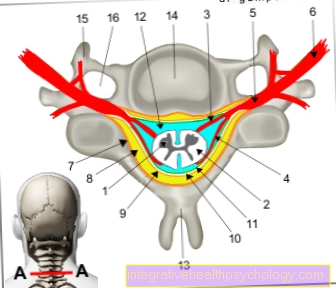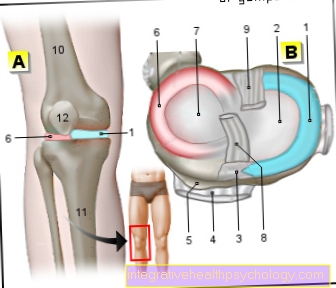Fear of anesthesia / general anesthesia
introduction
For most people, general anesthesia is a rare occurrence that can be accompanied by tension and fear. In today's medicine, anesthesia procedures are extremely low-risk and mostly uncomplicated methods of eliminating pain.
Doctors try to take the patient's fear away through planning and educational discussions, and they always try to make the atmosphere as pleasant as possible for the patient during the induction of anesthesia.
You may also be interested in this topic: Risks of anesthesia

How high are the risks with general anesthesia?
In general, general anesthesia is a routine procedure in which complications rarely occur. There is no general answer to how high the risk of general anesthesia is. . Too many factors play a role in the risk assessment. What can be said is that people with many secondary diseases and also overweight people have a higher risk than healthy, normal weight people. In healthy people, the risk of anesthesia is practically zero.
High-risk patients are filtered out during the anesthetic interview and the anesthesia is adjusted according to the respective risk profile in order to minimize the risks. Complications such as damage to the windpipe or vocal cords have become very rare, as has the inhalation of gastric juice. About 20 to 30% of people experience temporary nausea after anesthesia, but this is not dangerous and can be treated well.
You can find detailed information on this topic here: Risks of general anesthesia and general anesthesia and the common cold
Is the fear not to wake up justified?
The fear of not waking up from anesthesia is one of the main fears of many people. The risk of dying from the anesthesia itself is practically zero thanks to modern technology and easily controllable anesthetics.
Read more on the topic: Wake up time after general anesthesia
What is the reason for the fear?
The main reason for fear of anesthesia is that you have to surrender yourself to an unknown and frightening situation without protection. The knowledge that you are unconscious and completely at the mercy of another person, i.e. the anesthetist and the surgeon, can be very depressing. It doesn't help that you know that the doctors only do what is best for you.
Very few people can deal with the feeling of complete loss of control without fear. In addition, everyone has various other fears that he or she associates with anesthesia. Some are afraid to wake up suddenly or feel pain during the operation. Others, on the other hand, are afraid of not waking up at all. Knowing that you have to be ventilated during anesthesia can also be frightening for many patients. Losing breath drive is not a pleasant thought for many patients and contributes to the fear of suffocation.
The after-effects of anesthesia are particularly worrisome in the elderly group, as these are more pronounced in them. For more detailed information, see the following page: Anesthesia in the elderly
What can I do so that I can have anesthesia / general anesthesia despite my fear?
The fear of general anesthesia is no reason to cancel an operation. Nevertheless, you and the hospital staff can take some measures to keep the fear as low as possible.
Before the operation, the operation and the anesthesia are explained in personal conversations. In this context you also have time to ask all questions that have arisen and also to express your fears. Knowing in detail about the process of induction of anesthesia and the process of waking up can already take some of the fear away.
In the introductory room, where the anesthesia is prepared and started, doctors and nurses try to calm them down by talking to the patient and make the situation as pleasant as possible.
If the fear is still there and cannot be endured, sedatives can be given on the ward before the operation. You should honestly express your fears yourself. The better you are informed before the anesthesia, the less you have the feeling of being defenseless in an unknown situation on the day of the operation. There are also relaxation techniques that are easy to learn and which can help relieve tension and anxiety.
Read more on the topic: Induction of anesthesia - the right preparation
What are the alternatives to general anesthesia?
In addition to general anesthesia, there is also what is known as regional anesthesia. This is an alternative to general anesthesia for operations from the hip down or on the arms. With regional anesthesia, the respective body regions are numbed with local anesthetics. With this procedure, however, one is fully conscious. However, if organs in the abdomen or the head area have to be operated on, there is no alternative to general anesthesia.
Are you interested in alternative anesthetic procedures? Read detailed information here:
- Regional anesthesia
- Mask anesthesia
- Partial anesthesia





























